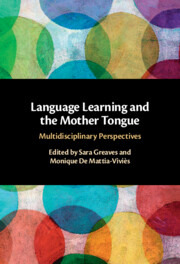Book contents
- Language Learning and the Mother Tongue
- Language Learning and the Mother Tongue
- Copyright page
- Epigraph
- Contents
- List of Contributors and Their Works
- Acknowledgements
- Introduction
- Part I The Mother Tongue and Second Language Learning
- 1 Entering into Language and into Languages
- 2 One Mother Tongue – or Two?
- 3 Embracing the Bilingual Overlap in Creative Second Language Learning
- Part II From the Mother Tongue to the Second Mother Tongue
- Part III The Second Mother Tongue as a (M)other Tongue and the Return to the Body
- Subject Index
- Author Index
- References
2 - One Mother Tongue – or Two?
from Part I - The Mother Tongue and Second Language Learning
Published online by Cambridge University Press: 16 June 2022
- Language Learning and the Mother Tongue
- Language Learning and the Mother Tongue
- Copyright page
- Epigraph
- Contents
- List of Contributors and Their Works
- Acknowledgements
- Introduction
- Part I The Mother Tongue and Second Language Learning
- 1 Entering into Language and into Languages
- 2 One Mother Tongue – or Two?
- 3 Embracing the Bilingual Overlap in Creative Second Language Learning
- Part II From the Mother Tongue to the Second Mother Tongue
- Part III The Second Mother Tongue as a (M)other Tongue and the Return to the Body
- Subject Index
- Author Index
- References
Summary
The author’s reflection takes off from Jacques Derrida’s Monolingualism of the Other or, the Prosthesis of Origin. The chapter proceeds by assessing the hesitant answer given by Barbara Cassin in response to a question from the audience (can we ever learn a second language to the level of our first?) at the end of a lecture entitled ‘More Than One Language’. Her answer is negative on the whole, and she evokes Hannah Arendt’s attachment to her native German. From these two points of departure the chapter seeks to give an account of what we mean by a ‘Mother tongue’, starting with a diachronic account. The Mother tongue isn’t a unitary entity; its construction is the result of a continued process of linguistic interpellation of the speaker; it is therefore the product not so much of an individual as of a social relation. Two detours, through Lucien Sève’s Marxist anthropology and the ‘tetraglossic’ theory of Henri Gobard, help account for this individual-cum-social construction of a speaking subject. The acquisition of a second Mother tongue can then be envisaged, a process that duplicates the acquisition of the original Mother tongue, thus giving a positive answer to the question addressed to Cassin.
Keywords
- Type
- Chapter
- Information
- Language Learning and the Mother TongueMultidisciplinary Perspectives, pp. 39 - 57Publisher: Cambridge University PressPrint publication year: 2022
References
- 3
- Cited by

